#fictional analysis
Text
saw a post once about how sam vimes is an urban witch and ankh-morpork is his stead, and now i’m reading a hat full of sky for the first time and a lot of it is sounding vimesian. stuff about how a witch tells the land what to be and the land tells her who she is. about how being a witch is like being a cop because when people are in need they don’t see you, they just see the pointy hat and know the person wearing it can Help.* about how it’s not really about magic, it’s about knowing how people think and how things work and doing what’s needed. and i don’t think you need to know me at all to guess how my trans self feels about strict gender roles, however cool they may be, so yeah. sam vimes is a malewitch. deal with it.
*my opinions about actual cops notwithstanding
#discworld#a hat full of sky#gnu terry pratchett#fictional analysis#if you're wondering what the hell i'm talking about but it sounds interesting#read guards! guards! for sam vimes#or the wee free men for where this particular idea of witchcraft took this particular shape#pre-tiffany witches just aren't the same somehow#i blame it on the fact that they're not learning it with us#but tiffany is
493 notes
·
View notes
Text
Some people will really say, "I support women's wrongs!" about some female character and then go on to explain that they think her actions are:
not truly women's (meaning her circumstances and/or the people around her are primarily at fault), and
not truly wrong.
...There are no remaining words in the phrase "women's wrongs"?
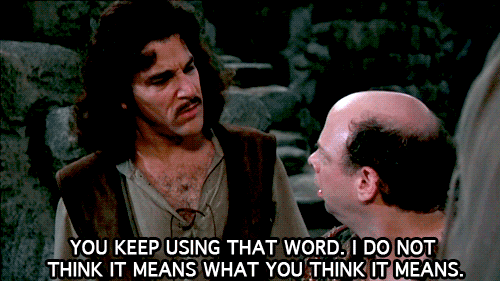
You are free to think of characters however you'd like (sometimes I might even agree with you), but some of us like villainous women and aren't cowards about it. I recommend you give it a try.
#They are fictional and it is allowed.#I support women's wrongs.#women's wrongs#As in wrongs.#Which are women's.#fictional analysis#media analysis#entertainment media#writing#fandom#female villains
10 notes
·
View notes
Text
Preliminary Review: Gladiator (2000)
Warning for spoilers.
New fandom just dropped: Gladiator (2000). It's set in pre-Christian Rome, so it uses ancient Roman mythology (e.g. Elysium) but still it's a compelling and tear-jerking story if you can suspend your disbelief properly.
Yes I like old movies. Yes it's more historical fiction. Yes I am now reading 2001 fanfic that was abandoned in 2004. Yes I post reviews anyway. So?
That movie was amazing. It suspended my disbelief like nothing has in a WHILE. It made me cry, which is tough to do.
In accordance with my recent character study on my top-ranking obsessions, Maximus the main character slots in BEAUTIFULLY but not in a typical way. His devotion and loyalty is to his family, his wife and son (and despite being away in battles for nearly three years, the movie does an amazing job convincing you that these ARE his greatest reasons for living) is his primary motivation. And he loses them. What follows is an astonishing exploration of his mental state following this, from apathy and passivity to simply surviving, to being revitalized in the name of revenge. Through it all is the theme of death - intimately close for a soldier and now gladiator - around every corner and in his thoughts continually as he thinks of his family. They are waiting for him in Elysium. In the end he dies - this is upsetting and distressing, of course, but also the only reasonable way it could have ended. His family was his reason for living. His family was his everything. What point would there be to life afterward?
It's an extremely interesting exploration of the theme that speaks to me; usually it's about a person's values and what they sacrifice for those values, and the level of significance that sacrifice was and what it meant. This time it's about having values (family) and refusing to sacrifice those to (some might think) a higher calling or duty. It's about losing, unwillingly, the things that are valued rather than sacrificing and/or regaining them.
However, Maximus the main character DOES also fit another common theme of my top obsessions: military or at least battle experience, despite the fact that I don't think I feel anything particularly strongly about the fact that a person is battle-hardened. But perhaps the combat experience shows another side to dedication and loyalty: that of risking life. Soldiers have strong force of will and self-control. Perhaps that life is necessary for the denial of self/desires for a higher cause that is inherent in my favorite themes. Thoughts to ponder.
#historical fiction#ancient rome#roman empire#gladiator (2000)#gladiator#fiction#fictional analysis#gladiator spoilers#spoilers#the only thing left to do#is to write a fic moving this from ancient rome#to Ascalon in GW2's Tyria#the charr society is based on Rome#I could absolutely see this playing out there#maybe with an imperator instead of a emperor#or perhaps TYRIAN historical fiction#regarding the one-and-only Khan-Ur#THAT would be interesting#not that we have much info on that timeperiod#oooh I could make it about Smodur or smth!#more thoughts to ponder lol#not that I'll ever get around to writing such a thing#this movie doesn't have me THAT strongly lol
5 notes
·
View notes
Text
I used to work for a trade book reviewer where I got paid to review people's books, and one of the rules of that review company is one that I think is just super useful to media analysis as a whole, and that is, we were told never to critique media for what it didn't do but only for what it did.
So, for instance, I couldn't say "this book didn't give its characters strong agency or goals". I instead had to say, "the characters in this book acted in ways that often felt misaligned with their characterization as if they were being pulled by the plot."
I think this is really important because a lot of "critiques" people give, if subverted to address what the book does instead of what it doesn't do, actually read pretty nonsensical. For instance, "none of the characters were unique" becomes "all of the characters read like other characters that exist in other media", which like... okay? That's not really a critique. It's just how fiction works. Or "none of the characters were likeable" becomes "all of the characters, at some point or another, did things that I found disagreeable or annoying" which is literally how every book works?
It also keeps you from holding a book to a standard it never sought to meet. "The world building in this book simply wasn't complex enough" becomes "The world building in this book was very simple", which, yes, good, that can actually be a good thing. Many books aspire to this. It's not actually a negative critique. Or "The stakes weren't very high and the climax didn't really offer any major plot twists or turns" becomes "The stakes were low and and the ending was quite predictable", which, if this is a cute romcom is exactly what I'm looking for.
Not to mention, I think this really helps to deconstruct a lot of the biases we carry into fiction. Characters not having strong agency isn't inherently bad. Characters who react to their surroundings can make a good story, so saying "the characters didn't have enough agency" is kind of weak, but when you flip it to say "the characters acted misaligned from their characterization" we can now see that the *real* problem here isn't that they lacked agency but that this lack of agency is inconsistent with the type of character that they are. a character this strong-willed *should* have more agency even if a weak-willed character might not.
So it's just a really simple way of framing the way I critique books that I think has really helped to show the difference between "this book is bad" and "this book didn't meet my personal preferences", but also, as someone talking about books, I think it helps give other people a clearer idea of what the book actually looks like so they can decide for themselves if it's worth their time.
Update: This is literally just a thought exercise to help you be more intentional with how you critique media. I'm not enforcing this as some divine rule that must be followed any time you have an opinion on fiction, and I'm definitely not saying that you have to structure every single sentence in a review to contain zero negative phrases. I'm just saying that I repurposed a rule we had at that specific reviewer to be a helpful tool to check myself when writing critiques now. If you don't want to use the tool, literally no one (especially not me) can or wants to force you to use it. As with all advice, it is a totally reasonable and normal thing to not have use for every piece of it that exists from random strangers on the internet. Use it to whatever extent it helps you or not at all.
45K notes
·
View notes
Text
Did I just make a new side blog to talk about fictional people?
Yes.
1 note
·
View note
Text
headcanon: "i have decided that this is true about the character, and it doesn't matter to me if the canon text supports my idea or not."
interpretation: "after considering elements present in the canon text, I have decided that this might be true about the character and here's why."
subtext: "I can show you strong evidence in the text and context of the work that this interpretation could be the actual authorial intent."
4K notes
·
View notes
Text
The curtains were blue because everything in the room was carefully colour coordinated, reinforcing the character's stylish and controlled characterisation. The curtains were blue because everything in the room was a different colour, reinforcing the character's eclectic and globe-trotting personality. The curtains were blue because the character is elsewhere established to hate the colour blue, subtextually implying that their deceased spouse was responsible for that decoration choice.
The curtains were blue because throughout their filmography the director consistently uses cool tones to mark moments of distance between characters. The curtains were blue to tie the events in that room into the broader oceanic motif of this particular novel. The curtains were blue because the assonance evoked a contrast with the following stanza of the poem.
Even the curtains looked expensive: floor to ceiling velvet drapes, in a flawless royal blue. She tucked the saucer up on the windowsill and tied back faded blue curtains with a loop of string. The narrow blinds were the same navy blue as the pinstripe suit of the man who served eviction notice that sent them to this office.
The curtains were blue because the author's childhood home had blue curtains, which they discussed in their letters related to their feelings of comfort in that place. The curtains were blue because the author's childhood home had blue curtains, which they discussed in their letters related to their feelings of grief in that place.
The curtains were blue as an allusion to the contemporary joke about literary criticism, an extension of the author's autocritical approach that will be further discussed in section seven.
The curtains were red, as a pun on;
The curtains were read.
45K notes
·
View notes
Text
Remembering Dismembrance: A Critical Compendium - Daniel Takeshi Krause

This is one of my favourite books a strange meta-fictional adventure, written as an essay on a fictional piece of work known as Dismembrance. Now that description sold me on the book straight away, that and the title, the titular Dismembrance is described quite vaguely in-universe, but it seems to me as if it is a novel that can be re-written at will by the general audience, a unique and interesting concept in and of itself, with segments coming from peoples memories, as such this book garnered a lot of critical literary study. Remembering Dismembrance frames itself as a compendium of all of these such literary analyses (all of which being fictional and written by Krause remember). This book is about memory, how it can change and develop over time, how our memories can never be perfect, and how we perceive the memories themselves. It is also about how we come together to analyse and understand the world around us. How community shapes us, and how it can shape our view of the world around us.
#book review#Remembering Dismembrance: A Critical Compendium#Daniel Takeshi Krause#book reccomendation#meta#fictional analysis
0 notes
Text
the longer i stay in fandom, the longer i think a huge amount of bad takes and discourse come from an... abundance of identifying with a character
to be clear, i don't think it's bad to identify with a character. far from it! i think that's part of what makes fiction so powerful.
and it's only logical people often attach to a blorbo because they're just like me, for real. a person will see some element of themselves-- their race, their gender, their sexuality, their hobbies, their family life, their specific flavour of neurodivergence-- and something just resonates. it gives them a way to explore and name this important part of themselves, a part they maybe didn't even know existed before it.
and everything is well and good until some split between them and the character shows up
because of course, no character, except an explicit self-insert written by yourself, will ever be a perfect 1:1 for your own experiences. so sooner or later-- maybe in canon, maybe in a fanwork-- your blorbo diverges from your lived experience in a huge way.
I think this is why shipping culture in particular gets so toxic. While it is by no means the only way to indulge with shipping, a significant portion is 'if i was in that character's shoes, i would choose X'. the fight becomes for your own self-identity.
but this gets expanded in other ways. a character who is revealed to be black when the majority of the fandom had just assumed they were white. or revealed to be queer, or maybe the 'wrong' flavour of queer. or fuck, even some more innocuous part of their backstory, one that's nonetheless so meaningful for SOMEONE, but now it feels like the story is saying, fuck you, we're doing something else
i don't know. i just feel acknowledging this perceived-attack-on-identity helps me understand why people react it what seems to be such outsized way to canon and fanworks alike.
at the same time, i think it's a really important thing to check in yourself.
it's nice, to see a character who you identify with. who resonates with for being like you. but it's also nice to acknowledge and appreciate the way characters are not like you at All. how great it is to get insight into this totally different lived experience. and to muse on how wonderful that recognition might be for someone who does have that background.
5K notes
·
View notes
Text
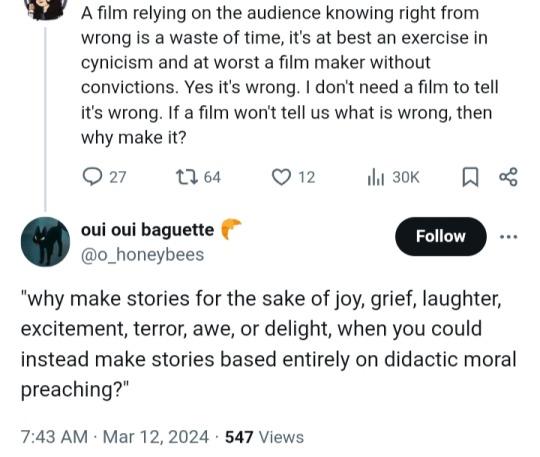
──────
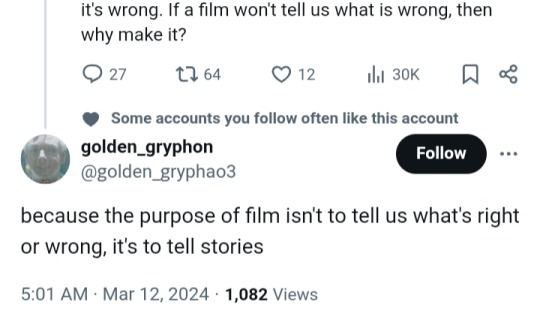
──────
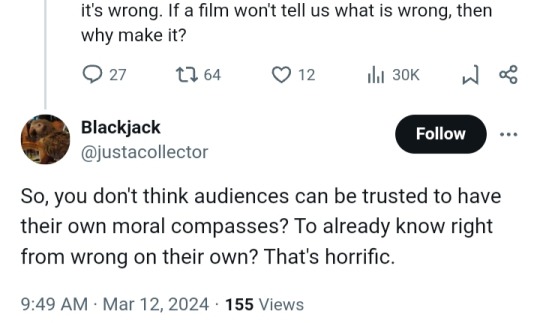
──────
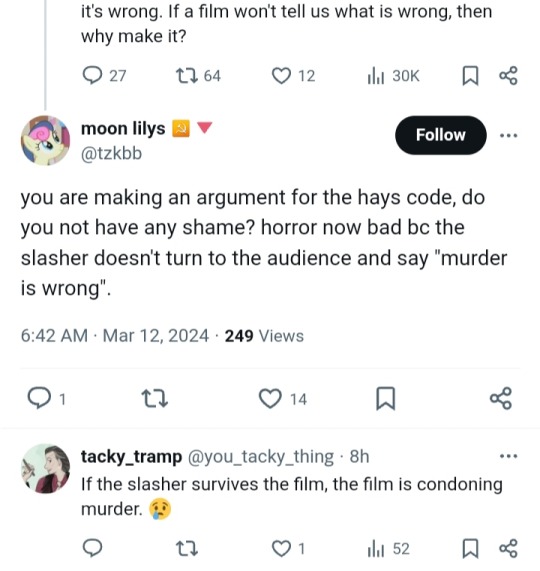
The perfect responses to people who insist creators "must" write all stories, even those aimed at adults, like a 1980s cartoon PSA and spoon-feed their audiences everything — or else they'll be accused of being "irresponsible" *eye roll* if they let their bad guys win a la Alex in A Clockwork Orange (1971).
#media analysis#villains#fiction is not education#depiction is not endorsement#media audiences aren't passive recipients#a clockwork orange#alex delarge#my posts
894 notes
·
View notes
Text
a really defining moment of aang and sokka’s relationship is that sokka literally lets himself get beat up for aang’s amusement and entertainment like a day into knowing him. like he is literally letting aang drop him onto the ground from a not insignificant height over and over again just to see aang smile and laugh. he is putting his own safety and physical wellbeing at risk because it makes aang happy. and there’s a lot we could get into here about how sokka fundamentally views himself and his body as a vessel through which to provide services to others instead of a whole human being in his own right, but what matters for the purposes of this post is that it’s very immediately established that sokka will do anything to see aang enjoy himself, to the point that he will quite literally put up with physical abuse without complaint to make aang happy. so when people are like “it’s crazy how sokka is so smart and yet loses all his braincells whenever he’s around aang,” it’s like yeah, teenage boy adhd2adhd communication will do that, but also a large part of it is sokka contorting himself into an image that he thinks aang will appreciate, because he knows just how valuable preserving aang’s childhood joy and laughter is.
and what’s beautiful is that through actively becoming this person for aang’s benefit, he also actually starts to internalize the sentiment. through the process of letting himself be silly and goofy for the sake of making aang happy, he also absorbs some of that sillygoofy happiness and regains some of his own childhood joy and laughter and sense of wonder he truly thought he had lost forever. he’s not just helping aang retain his childhood, but aang is also helping sokka regain his sense of humanity. the sokka of book 3 is someone who enjoys “wacky, time wasting nonsense” and throws beach parties, a far cry from the sokka of book 1 who thought fun and joy were luxuries no one could afford. his selfless love for aang is also self-affirming, helps him to embrace aang’s point of view, to love himself slightly more than he otherwise would have. because to love aang is to necessarily let kindness into your life; it’s to learn how to be free.
#sometimes i remember that aang is fictional and i cannot actually be friends with him and i feel genuinely distraught#but i am comforted by the knowledge that we WOULD be friends were he real and that’s what matters#aang#sokka#aang&sokka#analysis#there are a bunch of rly fucked up directions i could take this post#but i think I’ve talked abt the fucked up aspects of their relationship plenty lately#and there’s also smth just so beautiful & poignant & sweet about how sokka doing his whole ‘denying the self to serve another’ shtick#kind of just backfires with aang because he inadvertently learns how to have fun#i do also think suki is really the person who increases his general happiness levels the most tbh#but like. aang laid the groundwork for sure#holds them….
852 notes
·
View notes
Text
what i really really like most about cure sunshine isn’t just that she’s so incredibly trans, but that she’s perfectly trans. if the writers had just made her canonically trans, she would be the ideal trans cure. i cannot imagine a better trans precure. because being a girl is her main thing, in the way that so many cures have a “main thing”. there are other aspects to her life and personality that have importance to the plot, like her martial arts, and her relationship with her brother, and that’s important, because it makes her just like any other cure. but being a girl is the one that gets a handful of episodes specifically about it. she got an episode about accepting that she’s a girl, an episode about committing to living a life that reflects that she’s a girl, and an episode about finally getting to feel like one of the girls. and that's such a natural way to break that arc up. it’s also, uh, about as much as i’ve watched so far, actually, so now i’m going to hope her wrap-up episode sticks the landing, assuming they did those back then.
#anime#precure#heartcatch precure#fictional analysis#lgbtq+#gender#someday i'll shut up about her#today is not that day
46 notes
·
View notes
Text
of course you can read necros and cavs as a parallel to the gender binary bc A) you can do whatever you want forever and B) yeah there's plenty of textual evidence comparing the necro-cav bond to a marriage. however one thing i think many of these discussions keep missing is the fact that most people in the nine houses are not necros or cavs and do in fact exist outside of this binary. which would make it. not really much of a binary
#get ur warm takes here#i know other people have said this already but i really feel like this binary idea has proliferated recently#but i get it i mean in the books we have almost zero exposure to House citizens living outside this 'binary'#so it is a binary in the sense that you can apply it to our major characters who are from the nine houses#but i'm just not sure about extrapolating it to the whole fictional society#i do think there are comparisons to be drawn here i just don't think enough discussions account for this third group being most of#the population.#like do a thematic analysis for sure but personally i would stop short of saying 'joh created a new gender binary and forced everyone into#it' bc. what about all those other offscreen characters who are neither necro nor cav#the locked tomb#nonasbirthday
1K notes
·
View notes
Text
soon to be writing in-depth analysis' on ST characters.
yo!! I've been rewatching Stranger Things and unhealthy amount and, uh.... it's gotten to a point where I just want to write in excruciating detail about all the in's and out's of many of the characters. you might not know me, and how my brain works, but if you want a in-depth look of your fav ST character, or just have observations you wanna share, I'd love to read/write some with you!!
#stranger things#analysis#insight#favorite stranger things character#favorite tv shows#fictional analysis#idk how to tag this
0 notes
Text
So I found this Buyee auction for, I guess, 22 PPG model sheets and I’m not sure what the source for them is, but there are some interesting preview images:
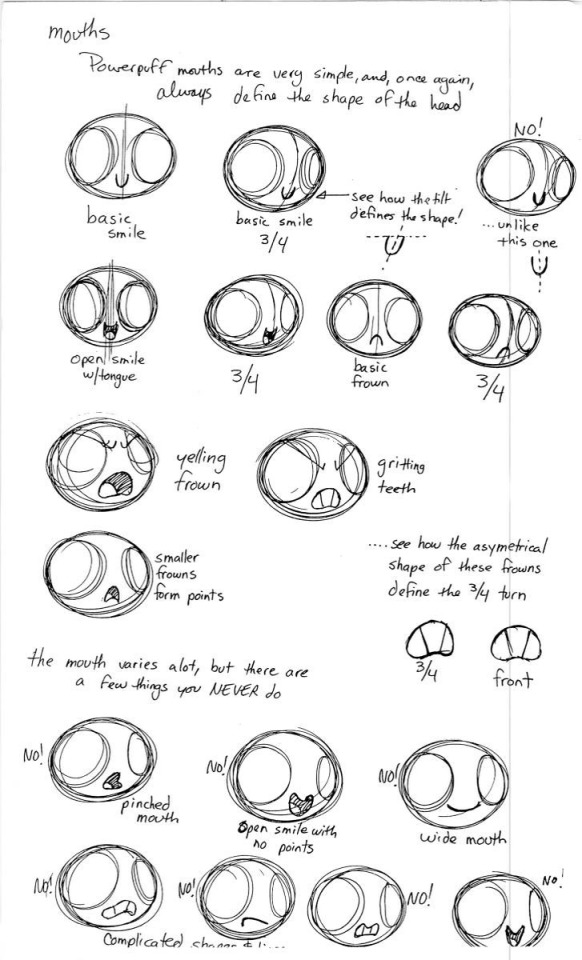


#I have no idea what these are from#I have done extensive handwriting analysis (literally 5 minutes of it lol) and I’m not sure who made this#but this is cool? someone snag this!#still drives me nuts that Blossom’s ponytail is a barrette#thick hair easily held in a barrette yep this IS a fictional show 🤣#powerpuff girls#the powerpuff girls#ppg
589 notes
·
View notes
Text
i love when characters that are always the one protecting others, staying strong for them, putting others first- get to be taken care of. get to fall apart, get to be soft and vulnerable, get to be protected and loved just as fiercely as they protect and love the people they care about
#eldest child#eldest sibling#dick grayson#dean winchester#character tropes#eldest daughter#character analysis#iykyk#eldest daughter syndrome#steve harrington#tropes#fictional characters#fictional tropes#fanfic tropes#fic tropes
592 notes
·
View notes